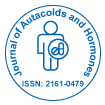Our Group organises 3000+ Global Conferenceseries Events every year across USA, Europe & Asia with support from 1000 more scientific Societies and Publishes 700+ Open Access Journals which contains over 50000 eminent personalities, reputed scientists as editorial board members.
Open Access Journals gaining more Readers and Citations
700 Journals and 15,000,000 Readers Each Journal is getting 25,000+ Readers
Indexed In
- Google Scholar
- Sherpa Romeo
- Genamics JournalSeek
- RefSeek
- Directory of Research Journal Indexing (DRJI)
- Hamdard University
Useful Links
Recommended Journals
Share This Page
| Victor Chaban | ||

|
Executive Editor |
|
| Biography | ||
Dr. Chaban received his Ph.D. from Bogomoletz Institute, Kiev and continued his training at Babraham Institute, Cambridge, U.K. He completed his post-doctoral training in Neuroscience at the Department of Medicine at University of California, Los Angeles and graduate training in Clinical Research at Charles Drew University of Medicine and Science. Currently Dr. Chaban is an Associate Professor of Medicine. He received Wood-Whellan Award from International Union of Biochemistry and Molecular Biology and Fellowships from European Science Foundation and UNESCO as well as NIH grants. He also received President\\s Award for Excellence in Service to Charles Drew University and Life Sciences Institute Emerging Scientist Award. Dr. Chaban is Director, Clinical and Translational Research Center; "Accelerating Excellence in Translational Science" (AXIS) and Co-Leader of Educational Core of UCLA Clinical and Translational Science Institute. He serves as Editor of Bioscience and International Journal of Research in Nursing. He is also a member of National Institute of Diabetes and Digestive and Kidney Diseases Special Emphasis Panel- ZDK1-GRB Study Section. |
||
| Research Interest | ||
The primary focus of my research program is to elucidate the nociceptive pathways modulated by circulating and local hormones in nervous tissue. While a central site of this modulation has been widely accepted, I have continued to investigate how they act on primary nociceptors and modulate the response to pro- and anti-nociceptive signals, depending upon the nature of the signals interacting at the level of sensory neurons. Nociceptive systems are implicated in the etiology of functional disorders such as non- cardiac chest pain, interstitial cystitis, fibromyalgia, acute or chronic abdominal pain associated with functional bowel disorders, chronic pelvic pain and others. Our studies may provide important information about the actions of hormones on primary sensory neurons for a better understanding the clinical presentation of functional pain-associated disorders.
|
||
| Interview | ||
1. How many years have you been associated with the current research? |
||

 Spanish
Spanish  Chinese
Chinese  Russian
Russian  German
German  French
French  Japanese
Japanese  Portuguese
Portuguese  Hindi
Hindi